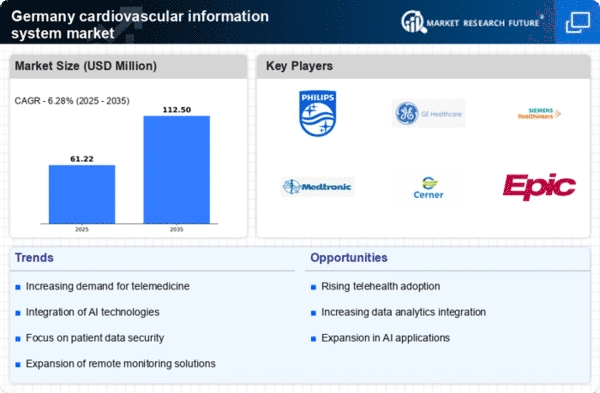Government Initiatives and Funding
Government initiatives aimed at improving healthcare infrastructure in Germany significantly impact the cardiovascular information-system market. The German government has allocated substantial funding to enhance digital health solutions, including cardiovascular information systems. For instance, the Digital Healthcare Act encourages the use of digital health applications, which may include cardiovascular monitoring tools. This financial support is expected to drive innovation and adoption of advanced information systems in hospitals and clinics. Additionally, the government's commitment to improving healthcare access and quality aligns with the growing need for efficient data management solutions in the cardiovascular sector, potentially leading to increased market growth.
Increased Focus on Patient Engagement
The growing emphasis on patient engagement in healthcare is a significant driver for the cardiovascular information-system market. In Germany, healthcare providers are recognizing the importance of involving patients in their own care processes. This shift is leading to the development of information systems that facilitate better communication between patients and healthcare professionals. Features such as patient portals and mobile applications allow patients to access their health information, schedule appointments, and communicate with their providers. As patient engagement becomes a priority, the demand for cardiovascular information systems that support these initiatives is likely to increase, reflecting a broader trend towards patient-centered care.
Growing Demand for Personalized Medicine
The shift towards personalized medicine is influencing the cardiovascular information-system market in Germany. Patients are increasingly seeking tailored treatment plans based on their unique genetic and health profiles. This trend necessitates the development of advanced information systems that can integrate diverse data sources, including genetic information, lifestyle factors, and clinical history. As healthcare providers strive to offer personalized care, the cardiovascular information-system market is expected to expand to accommodate these needs. The ability to analyze and interpret complex data sets will be crucial for delivering effective personalized treatment options, thereby driving market growth.
Rising Cardiovascular Disease Prevalence
The increasing prevalence of cardiovascular diseases in Germany is a primary driver for the cardiovascular information-system market. According to recent health statistics, cardiovascular diseases account for approximately 40% of all deaths in the country. This alarming statistic underscores the urgent need for advanced information systems that can facilitate better diagnosis, treatment, and management of these conditions. As healthcare providers seek to improve patient outcomes, the demand for integrated information systems that can streamline data management and enhance clinical decision-making is likely to grow. Furthermore, the German healthcare system is increasingly focusing on preventive care, which may further boost the adoption of cardiovascular information systems to monitor and manage patients at risk.
Technological Advancements in Healthcare
Technological advancements in healthcare are transforming the cardiovascular information-system market in Germany. Innovations such as cloud computing, big data analytics, and mobile health applications are enhancing the capabilities of cardiovascular information systems. These technologies enable healthcare providers to collect, analyze, and share patient data more efficiently, leading to improved patient care. For example, the integration of real-time data analytics allows for timely interventions in cardiovascular care, which is crucial for patient outcomes. As healthcare facilities increasingly adopt these technologies, the demand for sophisticated cardiovascular information systems is likely to rise, reflecting a shift towards more data-driven healthcare practices.
















